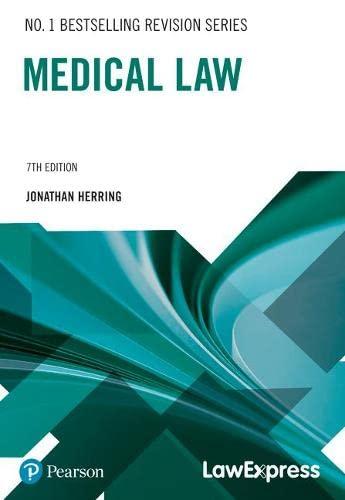Question
Note: All answers should be in bullet points( 3 for each argument or defense) Case #1: Atlantic Glass and Storefronts Ltd. v. Price (1974), 48
Note: All answers should be in bullet points( 3 for each argument or defense)
Case #1: Atlantic Glass and Storefronts Ltd. v. Price (1974), 48 D.L.R. (3d) 471 (N.S. Co. Ct.)
Mr. Price originally operated "Fins, Furs and Feathers" as a sole proprietor but neglected to register the change under the Partnerships and Business Names Registration Act when he incorporated the business as P.R. Enterprises Ltd. When the company failed to pay their supplierAtlantic Glass and Storefronts Ltd.the supplier sued Mr. Price directly instead of the company.
Plaintiff's Argument:
_
_
_
Defense's Argument:
_
_
_
Risk Mitigation (Defense):
_
_
_
Case #2: Red Burrito Ltd. v. Hussain 2007 BCSC 1277 (CanLII)
Hussain and Hingora operated the Papaya Market and they entered into a "letter of understanding" with Red Burrito, the operator of several restaurants in the Vancouver area to convert the market into another Red Burrito restaurant. A new company was to be incorporated, with Hussain and Red Burrito having equal shares. Red Burrito was to arrange and pay for remodelling and start-up costs and Hussain was to manage the business. Hussain was also responsible to arrange that the lease for the premises held by himself and Hingora would be assigned to the new company. The new company was never incorporated and the lease was never assigned. The remodelling was done and the business opened, but after a disagreement, Hussain locked the Red Burrito people out of the restaurant and continued running it himself. They sued claiming a share of the assets and lease.
Plaintiff's Argument:
_
_
_
Defense's Argument:
_
_
_
Risk Mitigation (Defense):
_
_
_
Case #3: Public Trustee v. Mortimer et al (1985) 16 D.L.R. (4th) 404 (Ont. H. C. J.)
Mortimer was a partner in a law firm and acted as the executor for the estate of Mrs. Amy Cooper. When she died, he distributed the proceeds of the estate to a series of beneficiaries. He also stole over $200,000.00 from the estate, keeping it for himself. The issue here was whether the other partners were also liable for Mr. Mortimer's wrongful conduct.
Plaintiff's Argument:
_
_
_
Defense's Argument:
_
_
_
Risk Mitigation (Defense):
_
_
_
Case #4: Schmidt v. Peat Marwick Thorne 1994 CanLII 453 (BCCA)
Mr. Schmidt worked as a partner in the Abbotsford accounting firm of Peat Marwick Thorne, when he informed the partnership that he wanted to retire and help his sons on their farms. The partnership agreement notice period was reduced considerably and the firm agreed to pay out Mr. Schmidt over $125 000 for goodwill from a previous merger, $65 000 for work in progress, a $55 800 "disposition fee" payable over five years, and a two-year consulting contract to cover the transition. The agreement also included a term that if he did enter into practice again the "disposition fee would not be payable," but that there would be no other ramifications. In fact, he never did intend to retire but had arranged to join another accounting firm, Ernst and Young, and take his clients with him. He eventually took 65 clients with him and had actually been soliciting several other accountants of the firm to go with him during the time he had been negotiating the earlyretirement agreement. The firm learned of his plans just after he left and stopped payment on the cheques they had issued. Schmidt sued to enforce the contract, and Peat Marwick Thorne sued for the losses associated with the clients lost.
Plaintiff's Argument:
_
_
_
Defense's Argument:
_
_
_
Risk Mitigation (Defense):
_
_
_
Step by Step Solution
There are 3 Steps involved in it
Step: 1

Get Instant Access to Expert-Tailored Solutions
See step-by-step solutions with expert insights and AI powered tools for academic success
Step: 2

Step: 3

Ace Your Homework with AI
Get the answers you need in no time with our AI-driven, step-by-step assistance
Get Started


